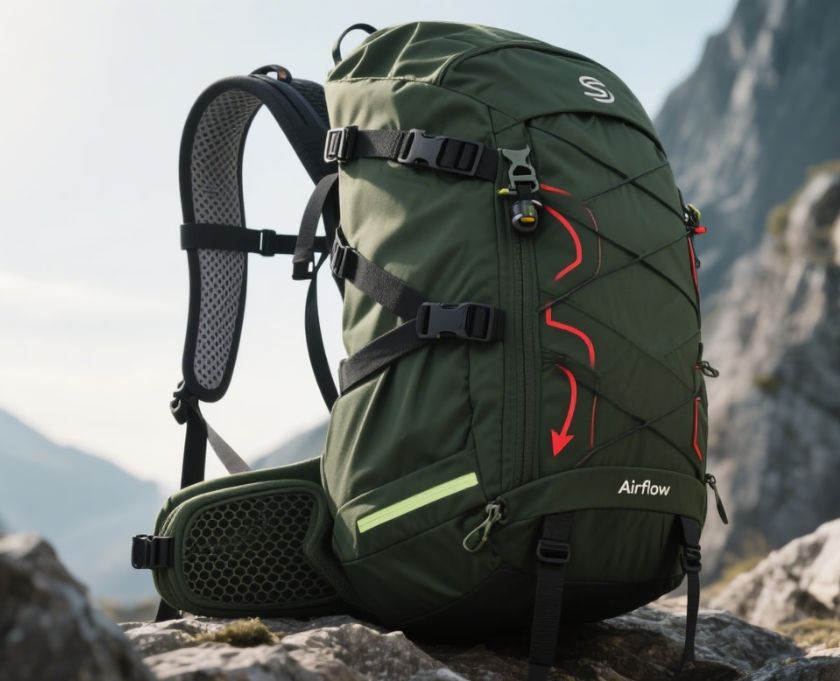Beautiful Plants For Your Interior

A hiking and camping backpack is more than just a storage bag — it’s the foundation of a successful outdoor adventure. The right pack can make your journey comfortable, safe, and efficient, while the wrong one can cause fatigue, disorganization, or even injury.
Why Choosing the Right Backpack Matters
Whether you’re on a day hike, weekend camping trip, or multi-day expedition, your backpack will be your closest companion. Choosing the right one ensures:
- Balanced weight distribution to reduce strain.
- Easy organization and access to gear.
- Protection against unpredictable weather.
- Comfort for long hours on the trail.
Key Capacity Options for Hiking and Camping Backpacks
30L–40L: For Day Hikes
Compact and lightweight, perfect for food, water, and emergency essentials.
50L–60L: For Weekend Camping
Ideal size for 2–3 day trips, fitting clothing, a sleeping bag, and cooking gear.
70L+: For Multi-Day Expeditions
Built for extended adventures where you carry shelter, food, and multiple layers of gear.
Essential Features of a Hiking and Camping Backpack
Durable and Weather-Resistant Materials
Look for ripstop nylon or polyester with waterproof coatings to withstand rugged environments.
Comfortable Suspension and Weight Distribution
Internal frames and padded straps distribute load evenly, reducing back and shoulder pain.
Adjustable Straps and Hip Belt
Helps secure weight to your hips, preventing strain on shoulders.
Ventilated Back Panel
Mesh designs improve airflow, keeping you cool during long treks.
Multiple Compartments and Pockets
Organize food, clothing, first-aid kits, and electronics for quick access.
Hydration System Compatibility
A built-in sleeve and tube port allow easy integration with hydration bladders.
Sleeping Bag Compartment
Keeps bulky sleeping bags separate from clothing.
External Gear Loops and Straps
For trekking poles, ice axes, tents, or mats.
Lightweight but Strong Frame
Carbon fiber or aluminum frames provide structure without unnecessary weight.
Reflective and Safety Features
Reflective strips improve visibility in low-light conditions.
Smart Features in Modern Backpacks
USB Charging Ports
Keeps your devices powered during multi-day hikes.
Solar Charging Panels
Perfect for eco-conscious adventurers.
Anti-Theft Zippers and RFID Protection
Keeps valuables secure, especially in crowded campsites.
Packing Checklist for Hiking and Camping Trips
Clothing Essentials
- Moisture-wicking shirts and base layers
- Insulating jacket
- Hiking pants and extra socks
Food and Cooking Gear
- Lightweight stove and fuel
- Freeze-dried meals
- Utensils and collapsible cookware
Navigation and Safety Equipment
- Map, compass, or GPS device
- First-aid kit
- Headlamp and batteries
Sleeping System
- Sleeping bag
- Sleeping pad
- Compact tent or hammock
Common Mistakes to Avoid
- Overpacking heavy gear, leading to fatigue.
- Ignoring weather conditions, packing unsuitable clothes.
- Choosing style over function, sacrificing comfort.
Expert Tips for Maintaining Your Backpack
- Cleaning and Waterproofing regularly extends lifespan.
- Proper storage prevents mold and material degradation.
- Inspecting for wear and tear ensures safety on future trips.
Recommended Hiking and Camping Backpacks 2025
- Best Budget Option – Affordable yet durable for beginners.
- Best Premium Backpack – Lightweight, ergonomic, and packed with features.
- Best Eco-Friendly Backpack – Made with recycled materials for sustainable adventurers.
FAQs
1. How big should a backpack be for weekend camping?
A 50–60L backpack is usually sufficient.
2. Can I use a hiking backpack for international travel?
Yes, but look for models with lockable zippers and durable construction.
3. What’s the best way to reduce backpack weight?
Prioritize lightweight gear and avoid unnecessary extras.
Conclusion
A great hiking and camping backpack is more than gear — it’s your partner in adventure. By choosing the right size, focusing on essential features, and maintaining your pack, you’ll ensure a safe, comfortable, and memorable outdoor journey.